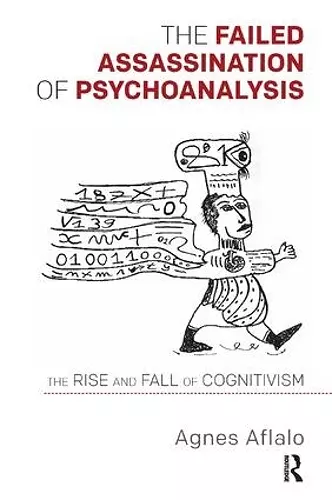The Failed Assassination of Psychoanalysis
The Rise and Fall of Cognitivism
Agnes Aflalo author Adrian Price translator
Format:Paperback
Publisher:Taylor & Francis Ltd
Published:15th May '15
Currently unavailable, and unfortunately no date known when it will be back
This paperback is available in another edition too:
- Hardback£135.00was £135.00(9780367102951)

It can happen that a law incurs the wrath of the very people it set out to protect. This is what happened in France at the end of 2003 with the Accoyer Amendment, a Bill that intended to regulate the exercise of psychotherapies even at the cost of the disappearance of psychoanalysis itself. The public that this law was supposed to protect thus ran the risk of finding themselves stripped of certain freedoms that democracy usually guarantees.How had it become possible to reach such a point? This is what this book sets out to examine. Evaluation and cognitive-behavioural scientism, which have been progressively infiltrating different forms of knowledge with destructive effect, undoubtedly played a major role. And then, the International Psychoanalytical Association, despite having been founded by Freud to protect his invention, started to endorse the forced cognitivisation of psychoanalysis. Meanwhile, psychiatry slid back into its nineteenth century hygienic obscurantism and its new recruit, epidemiology, began playing host to racialist discourses.However, the more evaluation steps up the commodification of knowledge and reinforces contemporary discontent, the more psychoanalysis in the Lacanian orientation demonstrates its public benefit. As Agnes Aflalo shows here with great clarity, this form of psychoanalysis is the only one to welcome the singularity of those who desire to find their way in the opacity of their symptoms.
'This is a liberating book. All those who, with their eyes fixed on antique modes of tyranny, run the risk of failing to recognise the decidedly human face that tyranny is putting on today would do well to read it.'- Bernard-Henri Levy, writer and philosopher'Psychoanalysis used to be in unison with a certain state of science and the world. But being itself a symptom of discontent in civilisation, it was unable to prevent the latter from worsening. It has not, however, said its last word, which is precisely the meaning of this "failed assassination": to maintain the necessary patience and flexibility for taking stock of the ravaging effects of cognitive-behaviourism.'- Nathalie Georges-Lambrichs, psychoanalyst, and member of the Ecole de la Cause freudienne 'They have been trying to palm off on us a behavioural, evaluated, quantified version of mankind that corresponds to a norm. Faced with the rise in power of practices of social control and human "dressage", The Failed Assassination of Psychoanalysis is a real breath of fresh air. When you get to the end of the book, you tell yourself that once again we have narrowly avoided the worst.'- Karim Sarroub, novelist and journalist at The Huffington Post'If every bungled action calls for interpretation, the "failed assassination" of psychoanalysis is no exception to the rule. With great brilliance, Agnes Aflalo has deciphered this state of affairs, opening a new breach in the shaky edifice of scientism and the imposture of the cognitive-behaviourists. She goes back to the very sources of cognitivism, and demonstrates the vacuity of its theses point by point.'- Deborah Gutermann-Jacquet, clinical psychologist and author of The Equivocations of Gender'With measured passion and carefully thought out argumentation, Agnes Aflalo invites us to discover what psychoanalysis in France recently escaped: nothing less than an assassination. The architect of this act is designated unequivocally: the discourse of evaluation. The author of the book traces this moment in history when the henchmen of cognitive and behavioural therapy, securely fastened to their death drive, attempted to reduce the subject to an object.'- Stephane Riand, lawyer and journalist'The rapid proliferation and mutation of regulatory and evaluatory bodies have become so much part of the ambient discourse of institutional practice that professionals in the field have not always been able to keep track of these changes or to pause to consider their implications. As a result, the gradual erosion of professional autonomy and patient rights that has accompanied the rise of the discourses of audit and evaluation, evidence-based practice, and payment by results has barely been perceived let alone opposed. It is perhaps here that the contrast and specificity of the circumstances in France, as detailed in Agnes Aflalo's book, prove enlightening in helping us find our bearings in the situation we currently find ourselves faced with.'- Roger Litten, psychoanalyst and member of the London Society of the New Lacanian School
ISBN: 9781782201649
Dimensions: unknown
Weight: unknown
192 pages